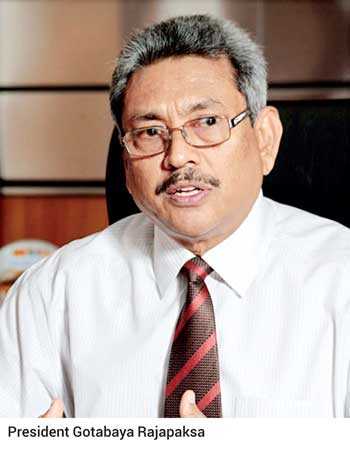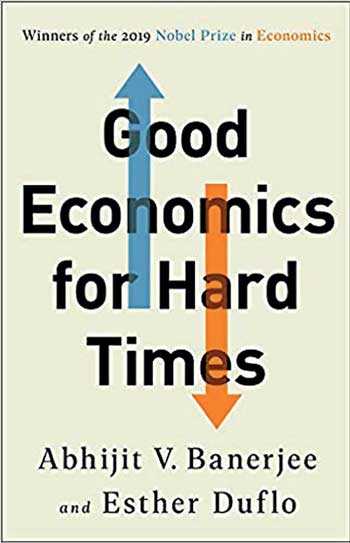Saturday Feb 21, 2026
Saturday Feb 21, 2026
Monday, 30 December 2019 00:53 - - {{hitsCtrl.values.hits}}
I used the above title of a non-fiction book released on 12 November by Abhijit V. Banerjee and Esther Duflo, both professors of Economics at MIT, the winners of the Nobel Prize. It shows how economics, when done right, can help us solve the thorniest social and political problems of our day.
‘Good Economics for Hard Times’ book makes a persuasive case for intelligent forms of intervention, based on sound research into real-life situations; and a society built on compassion and respect with discipline. 
Immigration, culture-based politics and inequality, globalisation, technological disruption, slowing growth, protectionism and accelerating climate change – these are major sources of great anxiety and uncertainty across the world today, mixed with fake and hate oriented means to communicate news across the modern world. These 21st century aspects and challenges are true and common from the US, UK, EU, India, Russia, China to the small island of Sri Lanka. 
Sri Lanka has a new Government with a strong mandate given to president elect Gotabaya Rajapaksa. Most Sri Lankans are not aware of the gravity of the economic status of the post-war Sri Lanka and the current challenges. Added to this, the extreme divisive politics of the country makes politicians give away promises at election times that can further harm the interest and the stability of the country rather than doing good to it in the long run. I have two observations in this regard on tax reforms and labour market stability as a new administration takes over the management of the economy facing another election in four months’ time. No doubt we are in bad times, but people are having new expectations whilst we are ever getting closer to a precipice if macro environment is not managed properly.
A tax bonanza for stimulation
The question is: Did President Gotabaya Rajapaksa win a landslide election due to his tax policies or employment policies? Not in my opinion, he won the hearts and the minds of the majority of people on the trust they placed on him on national security and the ability to push through reforms as a non-political figure and that remains his strength to-date. Otherwise the plate was similar or more with the losing candidate Sajith Premadasa on the tax and employment policies as mentioned in the manifesto.
At a glance, the total revenue loss to the Government due to proposed tax reforms, if one takes a snapshot vs. the 2019 budget expenditure/revenue is calculated to be around 28-30%. The adjusted revenue measures are not yet very clear which has given mixed signals of the policy direction as at today to both international and local financial market analysts.
In my opinion reducing the VAT from 15% to 8% overnight is a mistake; a gradual reduction from say 12.5% to 10% in the medium term would have been more advisable to allow adjustments to take a step-by-step approach. The fact remains the government revenue as a percentage of GDP is not at a satisfactory level although the situation was improving gradually whilst exports too are falling behind the target of $ 20 billon set for 2020 by the previous regime.
Secondly the VAT applicable slab too has been increased many folds from 12 million to 300 million. Obviously, the expectation of the government is to stimulate the economy which is very much needed after the 21 April incident. However, in my opinion many businesses who were not paying VAT or taxes earlier were slowly getting used to paying VAT and taxes and were induced to be innovative and creative in managing small businesses bringing in more efficient and professional financial practices to align with the formal economy. The exemption should have targeted towards startups to Rs. 100 million which would have been a better option in my opinion as NBT too was removed in a simplification process. The question also remains how many of these businesses would really pass on the benefits to the consumer to stimulate the economy?

The payee tax, income tax and withholding tax
The Government has also increased the individual tax threshold to Rs. 3 million per annum from 1.2 million and removed payee deductions to that amount which is even higher than Australia’s AUD 18,000 or Rs. 2.4 million per annum. Whereas the per capita income in Australia is around $ 55,000 vs. around $ 4,000 in Sri Lanka and the slabs are much greater in Australia. May be the logic behind the increase was that with the removal of the withholding tax of 5% basically no income including interest income will be exempt from income tax in the future and will be taxed as net income of individuals annually and most high earners including the higher payee category will fall on to 12% to 18% annual tax rate beyond the slab of Rs. 3 million.
This I believe will increase the tax net drastically beyond 2020 and the high earners will have to pay more direct tax, which I think is a good policy decision as many in this country are avoiding any income tax payments that is due to the Government. In fact, in 2015 I suggested to the then newly elected Government to make compulsory an income tax file when obtaining any employment which is a good practice and discipline of many developed countries inculcated to the citizen as they enter the labour market. The new Government’s policy I believe is a similar attempt to get more people to be accountable with income tax files in the future.
Labour market productivity and stability
It is critical for Sri Lanka to have a stable and a modern labour market to attract new technology driven investment and compete globally in hard economic conditions. As always pointed out in my columns labour sector reforms have been requested by the industry for more than two decades to improve productivity-based incentives. It is a fact that the labour force productivity across all economic activity in Sri Lanka is around 50% of what it should be. The cultural structure and the holiday patterns of the country that have been adapted since independence have made us less productive compared to the world standards.
The new Government needs to be careful in giving too much too early in bad economic times with debt payments mounting over the next three years and the world economy is also slowing down further. It is a much better approach to take a step-by-step approach and set manageable targets and educate the public of the realities of the macroeconomic challenges both domestic and external and the need for careful assessment and management of physical and monetary policy to navigate Sri Lanka into calmer waters
The new Government will have no options but to take strong decisions to change this mind set and turn a new direction towards efficiency, not only in the state sector but as a need of the country if we are to be a globally competitive hub like Singapore.
As of current labour laws and wages board standards, the minimum wage of Sri Lanka is Rs. 10,000; which is probably not the market rate which is around Rs. 17,500. However, I observed that the Government is considering a minimum allowance of Rs. 35,000 to 100,000 unskilled Samurudi recipients with some training, to be employed at locations where they could travel from home (http://www.ft.lk/news/Govt-to-recruit-100-000-from-Samurdhi-families/56-692302).
Word of caution
This can be a knee jerk reaction that can totally derail labour market stability as currently trainee graduates are paid only a maximum of Rs. 20,000 by most banks. Indeed, Sri Lankans need to improve their quality of life and income level over the medium term, but the question again, I pose is, are we putting the cart before the horse? The fact remains after 40 years of free market economy with very slow and late reforms in many sectors, we are still left with a primary export product basket with low penetration of technology-based industries. Can we afford to increase minimum salary (allowance) to jump over 200% without getting the environment we work in fixed on to a productivity-based platform and will such signal create unrest in other sectors?
The new Government needs to be careful in giving too much too early in bad economic times with debt payments mounting over the next three years and the world economy is also slowing down further. It is a much better approach to take a step-by-step approach and set manageable targets and educate the public of the realities of the macroeconomic challenges both domestic and external and the need for careful assessment and management of physical and monetary policy to navigate Sri Lanka into calmer waters.
There is enough private capital and investment around the world if Sri Lanka needs to tap them. However, the signals we give the international community needs clarity, predictability and justification if they are to believe in a stable Sri Lanka as a destination with new opportunities to invest.
Only good economics with corrective measures will attract investments and trust in the Sri Lankan economy in the long run. It would be always advisable for government to listen to constructive observations to look at implications from many points of view before taking dramatic steps on taxation and sensitive labour issues as in some cases the general public did not demand for such changes even at a time of an election.
(The writer is an economist, currently working as the CEO of the Shippers’ Academy Colombo and the Chairman of the logistics advisory committee of the Export Development Board.)